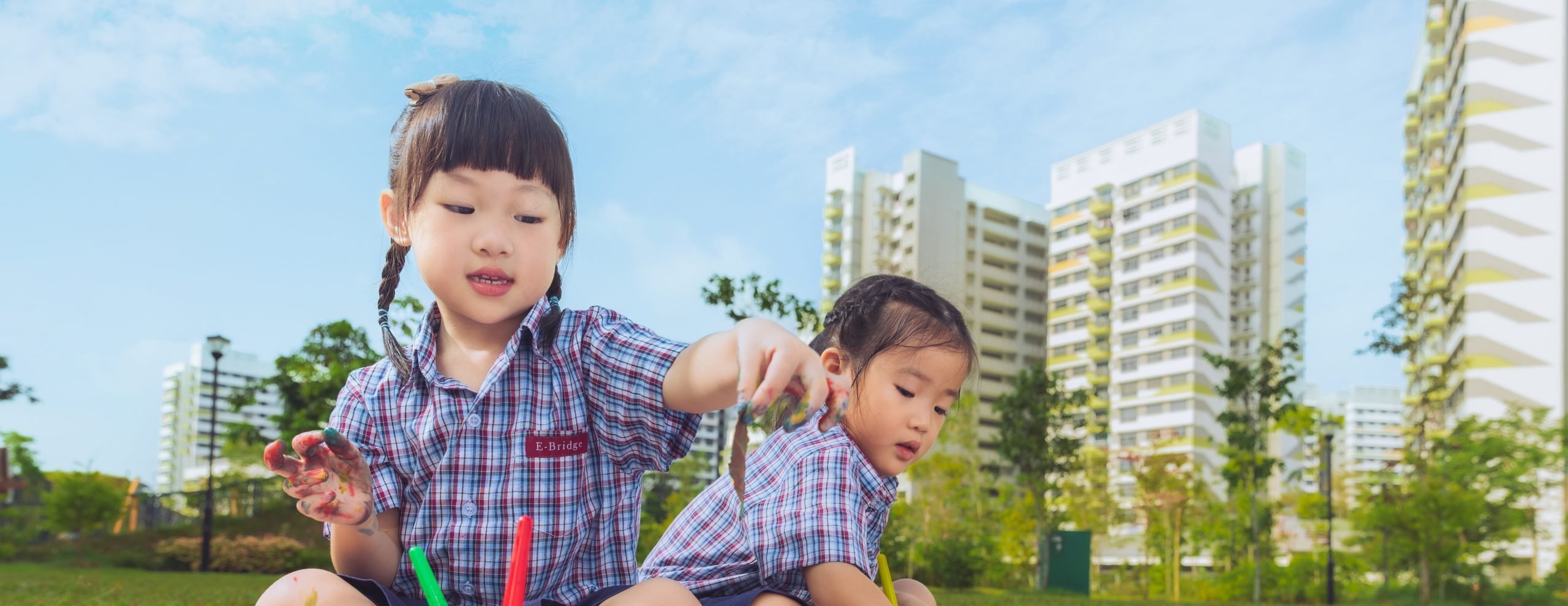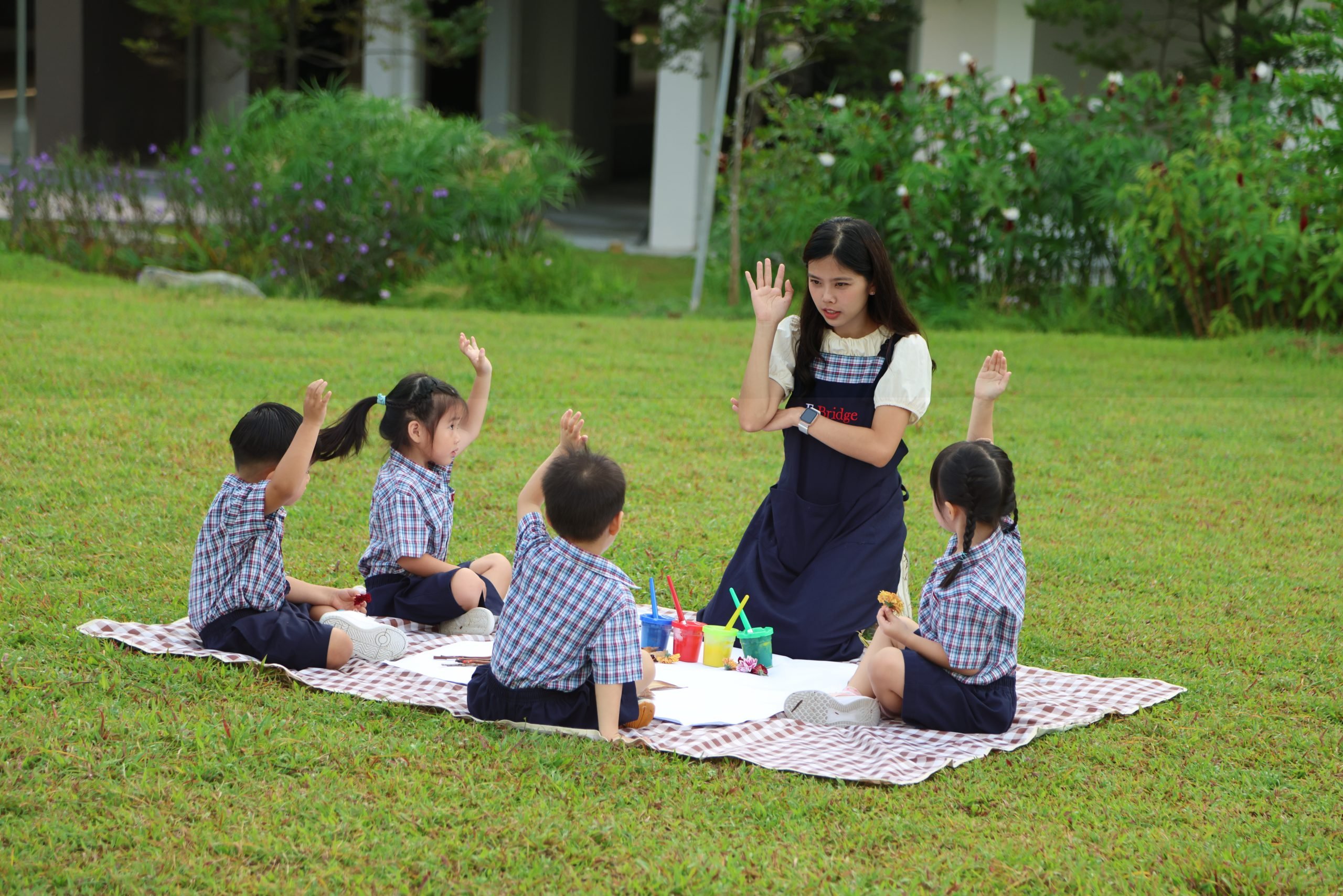Key Takeaways
- Learning through play is a thoughtful and intentional approach that nurtures children’s growth across all domains—cognitive, social, emotional, and physical.
- Everyday experiences, such as pretend play, sensory exploration, storytelling, and nature walks, are used to support skills development in children.
- Our educators design environments and interactions based on the Reggio Emilia approach, observing closely and responding to each child’s curiosity, ideas, and questions.
Fostering Early Childhood Learning Through Play

Play is a child’s natural language, and it’s one of the most effective ways they make sense of the world. At E-Bridge Pre-School, we embrace the power of learning through play as an important part of our curriculum, where each moment—from storytelling to nature walks—becomes an opportunity to discover the world and develop essential life skills.
Here are simple learning ideas for preschoolers that nurture growth through play, all while keeping things joyful and pressure-free at home.
What Is Learning Through Play?
Children learn best when they’re curious and free to explore. Play-based strategies allow children to build knowledge through movement, imagination, and hands-on experiences, rather than structured lessons. Whether they’re stacking blocks or digging in the dirt, they’re also developing language, creativity, problem-solving, and self-regulation along the way.
At E-Bridge, a trusted preschool in Singapore, learning through play is a core part of our teaching approach, rooted in the Reggio Emilia philosophy. Our classrooms are thoughtfully designed to spark exploration, honour each child’s voice, and support growth through curiosity-driven experiences—alongside other structured and holistic elements of our broader curriculum.
5 Everyday Play Experiences That Nurture Learning
1. Pretend Play: Building Confidence and Communication
At E-Bridge Pre-School, pretend play is a central part of our classroom environments. Whether children are role-playing in a mini “mama shop” or dismantling gadgets as young engineers, these imaginative experiences help them practise empathy, communication, and problem-solving in safe, familiar ways.
Our educators observe and extend this play, offering props, language, and scenarios that reflect the child’s interests. What may start as a simple story often grows into a meaningful learning journey, building self-expression, collaboration, and emotional understanding by learning through play.
2. Building with Blocks: Exploring Early Concepts
Our classrooms are intentionally stocked with open-ended materials like blocks, planks, and natural loose parts that encourage construction, design, and experimentation. As children build towers, ramps, or entire cities, they explore spatial awareness, measurement, balance, and cause-and-effect. These experiences lie at the heart of learning through play.
When a structure collapses, our educators support children in reflecting, rethinking, and trying again. These small but powerful moments build persistence and flexible thinking—key traits that are nurtured every day at E-Bridge Pre-School.
3. Sensory Play: Tuning Into the World With Wonder
At E-Bridge Pre-School, we invite children to explore the world through their senses. Our learning environments are intentionally designed with natural materials like clay, sand, and water. This encourages open-ended, hands-on learning that nurtures curiosity and discovery. Whether children are mixing textures, moulding shapes, or painting with earth-based elements, these experiences inspire close observation and thoughtful exploration.
Educators play an active role in guiding these moments, asking open-ended questions and encouraging children to express what they see, feel, and wonder. This inquiry-based approach supports the development of vocabulary, communication, and critical thinking, helping them begin to understand how the world works.
4. Story Time and Puppet Shows: Language and Imagination in Motion
E-Bridge educators are trained to use techniques like story time and puppet play to support language development, multilingualism, and emotional expression. We create joyful, interactive experiences that invite children to engage with language through movement, voice, and imagination, deepening their understanding of words, stories, and emotions. It’s a joyful, engaging way to foster creativity and confidence—and one of the simplest ways to embrace learning through play.
5. Nature Walks and Treasure Hunts: Discovering the World Together
We believe the natural world is a powerful educator. At E-Bridge, nature walks and outdoor explorations are an essential part of how we support children’s connection to their environment. Our facilitators often set up treasure hunts or invite children to search for textures, patterns, or shapes in the garden or playground.
These open-ended investigations reflect the Reggio Emilia approach, where children are encouraged to observe, question, and make sense of the world around them. With each discovery, they build vocabulary, critical thinking, and a sense of wonder.
The Lasting Impact of Learning Through Play

You don’t need elaborate setups or structured lessons to nurture your child’s growth. It’s in the little moments—like pretend games in the living room or walks through the nearby park—where some of the most meaningful learning takes place.
Searching for a preschool near you that prioritises learning through play? Look no further than E-Bridge Pre-School. Guided by the Reggio Emilia approach, we give each child the space to explore and grow at their own pace, helping them build the foundation for a lifetime of discovery. At the same time, we foster essential early literacy, numeracy, and social-emotional skills, preparing children for a smooth and confident transition to primary school.
Curious to learn more about our approach? Get in touch to discover how your child can thrive at E-Bridge.
